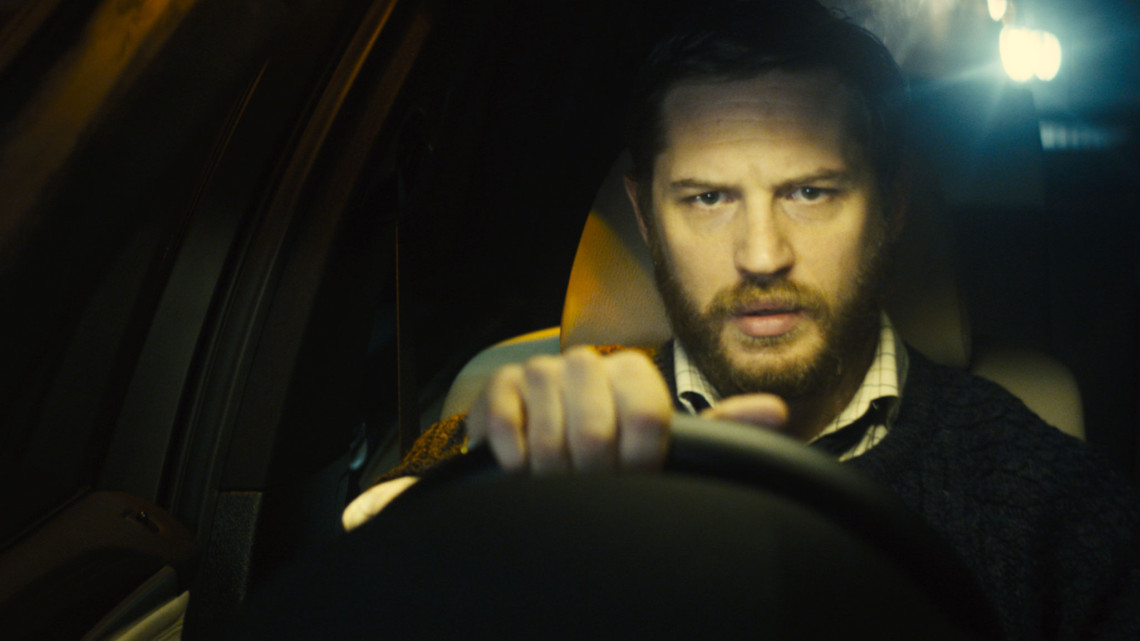Steven Knight’s debut feature as director, last year’s Hummingbird (or, to go by its more generic US title, Redemption), misplaced the screenwriter’s normally sharp sense of the plight of the lost and the disadvantaged amidst a too-basic morality play. But there was one thing: at the centre of this confused action thriller/socially-aware London gangster flick was a performance of heart and conviction; Knight drawing a soulful, understated turn from Jason Statham, of all people – if only the film had better served it. Make no mistake, Knight is much more confident on Locke; this time, the movie trusts the main performance unquestionably and, in upgrading his lead from action movie perennial to an actor often cited as one of the best of his generation, Knight gives Tom Hardy the best showcase yet for his ferocious magnetism.
Hardy’s construction manager Ivan Locke, a car, a few hundred miles of road and a phone, with Locke’s wife, children, mistress and business colleagues on the other end of the line — Steven Knight has made an agonizing thriller out of just these things. The film’s a testament more to Knight’s writing than to his skill as a director; there’s a sense of Knight taking an intentional step back after Hummingbird, replacing action with inaction and relying instead on his strength as a writer of dialogue, bunkering down to ostensibly create a nail-biting theatre piece. Certain directorial shortcomings are still apparent, but Knight as always has that keen sense for mundane social anxieties, and amplifies the tension through Hardy, a performer who we should by now assume is capable of almost anything.
It’s a performance every film fan and critic will be talking about come release time. Disguised by a grizzly beard and a thick Welsh accent, Hardy embodies Ivan Locke to the point where each line and facial expression appears instinctual rather than written. His Locke is initially almost inhumanly composed and professional under the circumstances — as he races from Wales to London to attend the birth of his illegitimate child, Locke stands to lose his job, his home and his family in a single car ride. This is the story of how this decent, connected modern man (the SatNav guides him, while his affairs are put in order over the 90-minute journey entirely via the phone) gradually collapses through mounting pressure.
There’s a winning dignity to Ivan Locke, as well as a sense of unease; it quickly becomes apparent that Locke buries his least desirable qualities because of how they remind him of his hated father. It’s left him a tortured man, struggling against his instincts to become some idealized form of a wholly good person. Here, he’s making decisions you wouldn’t ever want to make, but the film’s relatable in the sense that we’ve all at some point been forced to negotiate between what’s “right” for some and “wrong” for others, even if that disappoints people close to us in the process. We feel the ramifications of the character’s decisions on the other end of the phone line, and feel just as powerless to act.
Locke is almost Bressonian in its minimalist, tell-don’t-show approach to story, though Knight isn’t quite assured enough as a filmmaker to let the aesthetics match it, the film’s only real flaw being that the edit rarely rests. Phone conversations are continually glossed over with out-of-focus headlights dancing down the motorway where simple, uninterrupted shots of Hardy and the car would have sufficed. But when a filmmaker has made such a vast leap between his first film and his second, we can put visual restlessness down as an acceptable misstep. Much of your focus will be on the sound, anyway, Locke utilizing the very un-cinematic mobile phone in a marvelous way — by connecting the device to the car and making Locke’s contacts into disembodied voices playing out of the stereo, the interior of Locke’s BMW becomes a heightened environment for the increasingly exasperated character to react off of.
The film replicates the sensation of reading a good novel in a sense — we’re tied to this one space, with the action taking place somewhere off-screen, while Locke acts as our “narrator”. You fill in the blanks and much of the story forms as you see it in your mind. “All I have is this car,” remarks Locke at one point, and so do we, but the film is such an effective thriller precisely because Knight places us alongside the helpless man for the duration. Those could also be the anxious words of Steven Knight, who imposed upon himself an enormous challenge, especially for a second-time director, with Locke. Yet the car, and the actor, are apparently all Knight needed to begin crafting a superbly hermetic thriller.




















